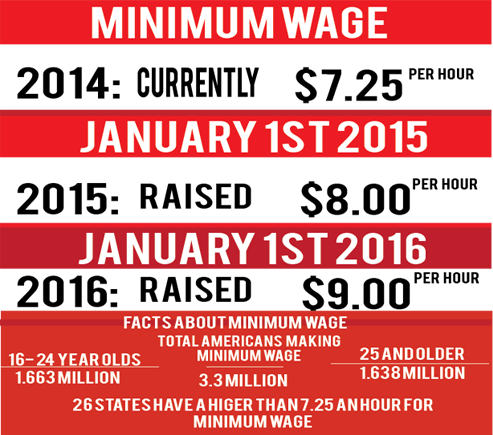
With the passing of Initiative 425 on Nov. 4, Nebraskan minimum wage earners will bring home a little more in their paychecks this coming January.
The passed proposal will raise minimum wage from $7.25 to $8.00 on Jan. 1, 2015 and then raise it again a year later to $9.00 an hour. 26 other states also have minimum wages set higher than the federal mandate.
Nebraska has 29,000 workers who make or are below the minimum wage. From the total population of workers, that number is near 2.84 percent.
In the Oct. 28 mock elections, West students fell in line with their fellow Nebraskans, with 65 percent of 1,024 students voting in favor of the proposal.
“I voted for it because I didn’t see a problem with it,” senior Sydney Davis said.
To get the issue on the Nov. 4 ballot, the organization Nebraskans for Better Wages collected over 135,000 signatures.
For many Nebraskans, the issue prompted debate over the purpose of the minimum wage.
“That’s what you have to ask yourself: Do you want a floor so employers can’t take advantage of the workforce; or is it a living wage?” government teacher Louis Harrison said.
Indeed, many students and staff at West feel the minimum wage is simply meant to keep employers from abusing workers and to provide a standard for entry level jobs.
“I think the role of minimum wage is probably more geared towards teenagers that just have a job on the side while they’re working in school. And then of course there are the people that are poorer, less fortunate, have had catastrophes in their lives that need a basic job to stay on their feet,” senior Walker Layne said.
According to the U.S. Bureau of Labor Statistics’ March 2014 report, around half of the workers in the U.S. making the federal minimum wage are 25 and under.
The report, however, only deals with those workers who make $7.25 an hour, not taking into account the 23 states with higher minimum wages at the time of publication.
Though the majority of those who voted in the mock election favored the then proposed initiative, many feared the increase would hurt, rather than help, the economy.
“It’s going to cause inflation across the board. People are going to start making more money so things will become more expensive,” Layne said.
For others, like Davis, who works at Abraham Catering in Ralston, the increase will likely provide a wage boost with minimal adverse economic effects.
“Because [Abraham Catering] is such a big company I really don’t think anything is going to happen. I think our minimum wage is going to go up and maybe [workers will receive] a couple less hours, but I don’t think a lot is going to change,” Davis said.
The minimum wage, which has been increased federally 22 times in U.S. history, does not keep value with inflation. Currently, according to the U.S. Department of Labor, the minimum wage would, “need to be more than $8 per hour to equal its buying power of the early 1980s and more nearly $11 per hour to equal its buying power of the late 1960s.”
Other states that raised their minimum wages after this year’s elections include Alaska, Arkansas and South Dakota.
Grant Harrison Editor-in-Chief



















